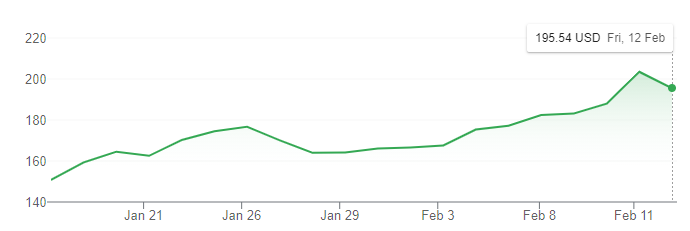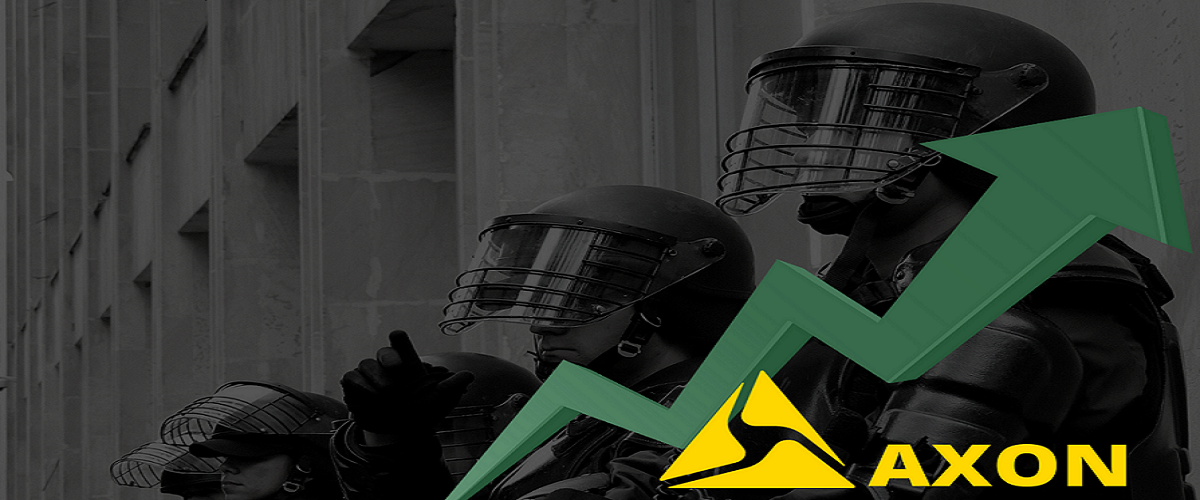January 22 was a memorable day for Axon Enterprise (Nasdaq: AXON). The TenderAlpha Database alerted that the Arizona company, which specializes in the development of technology, weapons, and equipment for military, law enforcement, and civilians, was officially awarded a sole-source contract by the Drug Enforcement Administration (DEA).
The deal is for one year, starting on January 29, and includes the provision of body cameras, charging and docking stations, cloud storage, and evidence database management.
Following the news, Axon's stock ended the day on an all-time high of USD 170.26 and has continued to rise ever since. At the time of writing, it has reached USD 195.54.
Figure 1: Axon Enterprise stock price movement (15 January - 12 February 2021)

Source: Nasdaq
Axon first became famous for the TASER - a line of electroshock weapons that reduce rates of lethal force used. Over time, the company has established itself as a market leader in the body cameras sector, combining these products with cloud storage services of footage and data, and the analytics solution Axon Cloud.
Axon is a company that relies heavily on its operations in the business-to-government market. Among its major clients are state police departments, such as the Cincinnati and Atlanta Police Departments and Arizona's City of Maricopa Police Department, but as we will show later, Axon is also actively looking to expand on a federal level.
In Q3 of 2020, the company reported a record USD 38 million in bookings from federal customers, an astonishing 400% rise year-on-year, which is a clear indicator of its intensive efforts within the federal market (Axon Q3 2020 Shareholder Letter).
Size Does Not Always Matter
What is remarkable about the DEA contract is not its value. In fact, it is a fairly small deal, compared to other awards Axon has won in the last half a year.
The contract is worth just over USD 34,000 - a paltry amount in comparison to the USD 13 million order from U.S. Customs & Border Protection for body cams and digital evidence management announced on September 23, 2020. Or, indeed, to the USD 15.5 million contract Axon was awarded for its trademark product - TASER - by the Department of Homeland Security, again in Q3 of last year.
Yet, those two multimillion-dollar contracts did not have quite as much of an impact on the company’s stock price as the one from the DEA. This is evident from the figure below.
Figure 2: Axon Enterprise stock price movement (March 2020 - February 2021)

Source: Nasdaq
The significance of the contract in question lies in the potential it holds for Axon to penetrate into new market segments by utilizing its advanced technological solutions.
Axon’s Technological Advantage
Body-worn cameras are audio and video recording devices worn by law enforcement officers as part of their uniforms to document what they see and hear in the performance of their duties. As per the contract requirements, the DEA insisted that the storage solution have the ability to ingest, manage, and share video captured during operations.
Furthermore, the agency required digital evidence management software in the form of a Software as a Service, which is hosted in a vendor-provided cloud environment. This type of evidence is usually used to store, manage, secure, share, redact, and protect digital evidence, normally in the form of video, photo, and audio records.
Axon’s market proposition is unique in that Axon Evidence is the only FedRAMP-Authorized software solution, which allows for Citizen Digital content request/ingest and AI-powered Redaction. The software can also store and support various forms of third-party data, as well as ingest evidence collected from the mobile phone application.
Unlike its competitors, Axon combines its hardware product line of body cameras and TASER smart weapons with a range of software solutions, such as the aforementioned Evidence system. Companies like Digital Ally, Mark43, and Getac Video Solutions specialize in developing only software or hardware products, failing to match Axon’s holistic offering.
It is a true testament to the technological prowess of the company that the DEA found no other provider of body cameras that could offer a similar product meeting the agency’s requirements, especially the Digital Evidence Management Program. What is more, no other vendor could provide direct access to Axon’s Evidence.com database system.
That being said, the contract award can be seen as a proof of concept for Axon’s product development capabilities. It is also likely that it will further stimulate the business’ R&D efforts so that Axon stays ahead of the competition.
Moreover, working closely with a federal agency of DEA’s stature could be a fantastic learning experience for the company where it will get the chance to obtain an insider’s view of the agency’s specific needs. This will enable Axon to fine-tune its proposition, in order to better serve federal customers of DEA’s caliber in the future.
International Growth on the Horizon?
Owing to the DEA being particularly active overseas, there also arises an opportunity for Axon to expand its client base internationally. Worldwide the DEA has 91 Foreign Offices in 68 countries (DEA). The organization offers investigative assistance and leads to DEA domestic offices and other agencies, and provides training and technical equipment to host nation participants to initiate and carry out complex criminal investigations.
In addition, the DEA assists its foreign law enforcement counterparts in developing drug control laws and regulations and provides them with training and material support.
The contract between Axon and the DEA could, therefore, turn out to be a gateway to a host of overseas markets for Axon, provided that it fulfills its purposes. It could introduce the company to DEA’s network of global partners and help it set up valuable business connections.
In Q3 of 2020, Axon posted a USD 23 million international revenue - up 43% year-to-date (Axon Q3 2020 Shareholder Letter) - following the signing of a number of international contracts with authorities such as the Toronto Police Services, the London Metropolitan Police, the UK Government, and the National Police of Ukraine.
Such positive figures will inevitably whet Axon’s appetite for an even stronger performance overseas and they can be regarded as a platform to build upon in the future.
The Bottom Line
TenderAlpha.com’s capability to monitor global government procurement data enables its users to retrieve and analyze tenders that can be true game changers for their winners. Such is the case with Axon’s award from the DEA.
The most important conclusion we can draw from this contract is that size does not always matter. Evidently, even modestly-valued tenders can fundamentally affect the growth of a company and increase the possibilities ahead of it.
Having examined the potential upshot of the DEA contract for Axon’s future, it is possible to forecast a further increase of the company’s stock price, fueled by its continual success.
The recognition of its market offering from one of the most well-known federal agencies in the US, combined with the opportunity to learn from the DEA’s vast experience, promises exciting months ahead for Axon. Should the partnership yield the desired results, Axon could hope for an extension of the collaboration, which may also open up a series of lucrative international business opportunities thanks to DEA’s rich global presence.
By subscribing to TenderAlpha’s Alerts Service, you will never miss an important tender that can significantly change the prospects for a given company. Go ahead and request your demo now!
This article was written by members of TenderAlpha's team and does not serve as a recommendation to buy Axon or any other stock. TenderAlpha is not receiving compensation for it and we have no business relationship with any company whose stock is mentioned in this article.
